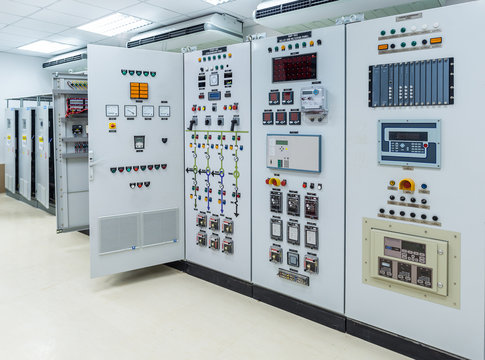AWhy electrical panels are useful in various industries may arise in your mind. But don’t worry we are here to provide you a complete detail about the electrical panel how and why these electrical panels are used and benefits your industry as well. Buying electrical panels can benefit the industry by providing complete electrical support.
But before directly jumping into the other topic you must have a little knowledge about what is electrical panel. Let’s start!
What is an Electrical Panel?
An electrical panel is a type of distribution board that helps in dividing electrical power flow into circuits and offers a circuit or protective fuse to distribute electricity throughout a building or enterprise. A vital electrical component that controls and monitors a variety of mechanical operations is housed in an enclosure, typically made of metal or plastic, known as an electrical control panel. Also, For the vast majority of businesses, they are usual and crucial. Operators will engage with the controls on the panel to operate and manage the plant and process. The parts of the control panel will simplify a number of tasks. Avoiding them can result in issues that endanger people and harm any corporate operation. Because of this, understanding how to use would be advantageous for both electrical and non-electrical workers.
Types of Electrical Panel
The electrical panel is available in a wide variety of ranges and sizes. Also, it has different types of panels. Some of the types of electrical panels are mentioned below:
1. MCC Control Panel
In order to operate motors from a central location, MCC, or motor control centers panel, are mostly utilized in big industrial settings and commercial applications. The MCC panel is made up of circuit breakers, a contactor, a variable frequency drive, motor starters, capacitor banks, and other parts. Power contactors, protection relays, isolators, and different control and indication devices are included in each enclosed component of the motor control centers. Common busbars connect these closed parts.
The motor control center also features safety protection tools such as motor protection preventers, earth fault relays, and phase reversing relays.
2. PCC Control Panel
PCC or power control center is the main panel used to control all the machines and huge systems easily. It contains all the components including the air circuit breaker, MCCs, and suitable size copper or aluminum busbar. The power for all of the switchgear enters the control panel through the primary circuit breaker. The metallic bus bars are designed to connect the feeders for incoming and outgoing power. Also, For simple system handling, there is plenty of space available for cable termination.
Additionally, protection and safety devices against short circuits, overload earth faults, under voltages, and overvoltages are offered to the power control centers.
3. HVAC Panel
Like the PCC panel, it delivers great power as well. Exhausts, air conditioners, chillers, cooling towers, pumps, and other HVAC apparatus are all connected to the HVAC Panel. The Main LT Panel is also used for its incoming. HVAC, meaning heating, ventilation, and air conditioning, is an abbreviation. A complete home comfort system that can be utilized to heat and cool your house as well as improve indoor air quality is referred to as an HVAC system.
4. Power Factor panel
Power factor is mainly used for the intelligent selection of transmitter power output to achieve good system performance. It carries its own load. Also, A capacitive load called a power factor panel is used to increase the power factor in order to reduce the penalty. It is directly connected to the LT panel to raise the building or company’s overall power factor.
5. Transfer switch panel
It could be fitted alone or as a component of the LT panel. Transfer switches, circuit breakers, and other components are included. This panel’s primary job is to change the building load from DG to EB or EB to DG. When the primary utility power supply is available, it uses that source of power; but, when it is not, it connects the load circuit to the DG.
A transfer switch panel is a kind of transfer panel used with a diesel generator to seamlessly switch between the mains and the generator in the event of an electrical outage. Also, The main supply will determine when the generator starts and stops.
Benefits of electrical panel
1. Increased efficiency
Electrical control panels assist guarantee that the equipment and processes will function in the most effective and efficient way possible since they can be tailored to provide a centralized location from which operators can monitor and alter the whole range of process variables. Users can use data from the equipment to determine in real-time whether the equipment is operating as it should be based on pre-programmed setpoints when they integrate PLCs and other control hardware into the panel. This enables operators to quickly take corrective action and return equipment and processes to the ideal process variables, ensuring optimized conditions.
2. Secured
Humans with industrial machinery can be a dangerous combination, especially when manual labor is required for maintenance, cleaning, or other tasks. However, the dangers to workers can be greatly decreased by using electrical control panels to run and regulate operations that are safely away from pinch points and moving parts. Also, Two-handed controls, which require operators to operate machinery with both hands, can also be added as safety features to further limit the chance of injuries by keeping them out of harm’s way. Electrical control panels have power controls that are simple to access and can instantly disconnect the current to the equipment in case of an emergency, which increases safety. These elements work together to support facilities’ continued adherence to applicable safety rules and decrease
3. Protecting equipment from damaging the environment
Industrial buildings can be filthy, dusty, wet, and exposed to weather conditions like rain, sleet, and snow. All of these conditions can cause havoc on delicate electrical components. Also, The lifespan of the components inside is fortunately ensured by the fact that electrical control panels are made to keep impurities out, endure equipment and facility washdown operations, and can be used outdoors to give protection from weather-related elements. Consult the NFPA 70 National Electrical Control recommendations to make sure your control panel satisfies the unique requirements of the setting in which it will be installed.
4. Reduced downtime
If an electrical control panel has the appropriate controls, they can be utilized to detect or foresee any performance problems brought on by malfunctioning parts. This kind of information can be utilized to notify operators and maintenance personnel that maintenance is required before equipment malfunctions when it is readily accessible via control panel indicators. When maintenance can be planned in advance, it greatly eliminates expensive unscheduled downtime and raises the dependability and productivity of the equipment and facility.
5. Increased quality
Automated systems with electrical controls in one central location can be managed with more care and attention and with less human interaction. Also, It lowers the possibility of human error and increases process consistency, repeatability, and reliability, which results in more consistency and better product quality.
Conclusion
I hope this article helps in better understanding electrical panels. As above explained, the electrical panels are an ideal component in the electrical field to arrange a large volume connected to one metal box for the purpose of distributing electricity.





